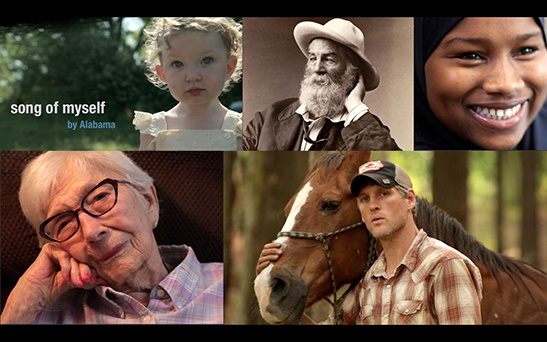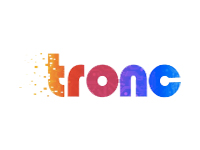Alabama Media Group’s first artist-in-residence
Paraphrased from Laura Hazard Owen, Nieman Journalism Lab, 06/03/2015
These are really the thoughts of all men in all ages and lands, they are not original with me,
If they are not yours as much as mine they are nothing, or next to nothing,
If they are not the riddle and the untying of the riddle they are nothing,
If they are not just as close as they are distant they are nothing.
Walt Whitman wrote the above lines of poetry in his poem Song of Myself in 1855. One hundred and sixty years later, the lines are coming to life again in the stories and voices of the Alabama residents featured in Song of My South, a new documentary film project. The project is led by filmmaker Jennifer Crandall, the first artist-in-residence at Alabama Media Group. (The Advance-owned collection of newspapers and digital properties, including cities such as Birmingham and Mobile).
An artist-in-residence inside the newsroom was the brainchild of Michelle Holmes, Alabama Media Group’s vice president of content. “Despite being in a time of amazing reinvention of our industry, I think much of what is happening right now in American journalism is stale from a creative standpoint. By creating a new kind of role in a media company, I hope to open our doors to talented storytellers who feel limited by journalistic convention and want to push deeper into the heart of creating compelling work, period.”
Jennifer Crandall, a former video journalist at the Washington Post and a video editor at Salon, is working with Chip Brantley, non-fiction author and senior lecturer at the University of Alabama, and Bob Miller, a photographer and filmmaker, on Song of My South.
One of Holmes’ goals in creating the artist-in-residence program at Alabama News Group was to help transfer skills and knowledge between the artist-in-residence and the rest of the newsroom. Crandall is helping to train Alabama News Group’s visual staff in both shooting and editing techniques and is also talking to journalists who are more used to working with text about how they can start making the foray into video. “A lot of the best video, and most viral video, [is shot when] someone was quick-thinking enough to pull out their phone at the right moment,” said Crandall.
Holmes is open to the idea of choosing a new person to be the artist-in-residence every year, though she hasn’t decided yet and has yet to take any action on it. “I want to be careful not to establish a program that simply exists to exist,” she said. “I’m hoping this project can serve as a catalyst to allow us to engage in new ways with artists and people supporting the arts. I hope the publication of this work will bring other ideas to us worth considering.”
"Culture here runs deep and rich"
When the project is finished, each of the 52 stanzas of Song of Myself will be read out loud and on video by at least one person. Finding the readers — some famous Alabamians and everyday people — is a “real week-by-week [challenge],” Crandall said. “I get in the car a lot, drive around the state, and will often just stop people I see in restaurants or on the street. It comes in all different ways, but most importantly, it’s still happening — we’ll probably launch before we’ve captured” all the verses of the poem.
In one video, a mom recites a few lines of poetry while holding her toddler as her son plays and her husband works off in the distance. In another, Mariam Jalloh, a teenage girl from Guinea reads her lines with gusto. I asked Crandall if her team gave people any instructions on how to read the poem.
"No," she said adamantly. “The thing I really emphasize with each person is to read this in a way that makes you feel comfortable. We have no expectations about a way in which anyone has to read or express themselves; they read it however they want to read it. I don’t want anybody to sound like ‘a poet’ when they do this. I want people to read it as themselves, mistakes and all.”
Reading a poem in front of a camera doesn’t seem as if it would feel particularly 'natural.' “Cameras can freak people out. People feel as if they want to perform for them, and we want to avoid that,” Crandall said. So “it’s about making people, throughout the production process, feel as comfortable with who we are as a team as possible.” This means a variety of things from reminding the reader that it’s okay to make mistakes to stopping and restarting filming multiple times, or simply just listening. In the videos I watched, the readers did seem comfortable — or, if not totally at ease, at least happy. The filmmakers asked readers to choose places where they wwould feel the most comfortable and to do what they’d normally do in those environments; one man read his stanza at a table in a restaurant where he’s a regular, pausing only to thank the waitress.
So far, most of the people that Crandall has asked to participate in the project have agreed to do so. She says that she "[...] usually explain[s] a little bit about the poem, how it was written in 1855, but so many of the scenes that are found within it are things that we’re still struggling with in our current lives as Americans and as Alabamians — race, religion, politics, sexuality, immigration. We’re all individuals, but we’re all part of this universe as a whole. Then, I say, I’m just asking you to be one part of that. I’m utterly thankful and amazed, it’s such a gift, that people more often than not are absolutely ready to jump right in.”
Jennifer Crandall has been living and working in Alabama for about a year and a half, but before that she’d never been to Alabama. “I was really struck by what rich soil this is to till for great stories,” she said.
“Culture here runs deep and rich and far back [into] American history in ways that mean a lot, not just to Alabama but to the rest of the U.S. It’s a privilege to be here and to see how the South has played a part in our past and our current identity. Part of this project is to bring that to the [forefront] in a fresh way… The South, I think, is hallowed ground, and oftentimes, I think Americans are a little bit ashamed of its past. Rather than turning our backs on it, we need to turn toward it. We need to think closely about what it means to our identity as Americans.”
PHOTOS COURTESY OF JENNIFER CRANDALL/ALABAMA MEDIA GROUP
+1 267-657-0207
or
Request a Live Demo

Alabama Media Group
Jennifer Crandall, Song of My South




















